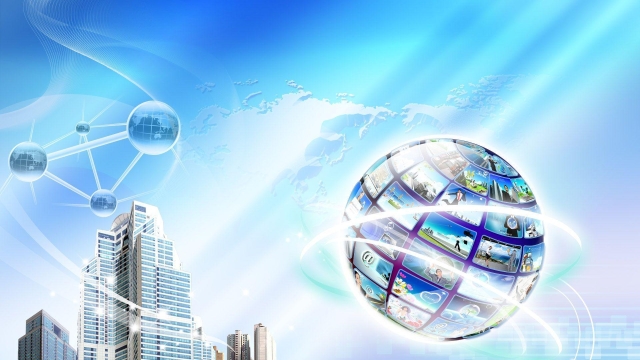Technology has revolutionized our lives in ways we could have never imagined just a few decades ago. It has become an integral part of our daily routines, shaping the way we communicate, work, and even entertain ourselves. From the invention of the telephone to the emergence of the internet, technology has continually pushed the boundaries of what is possible, leading us into the digital frontier.
In this ever-evolving landscape, we find ourselves navigating a world increasingly defined by digital innovation. We witness the birth and rapid growth of groundbreaking technologies such as artificial intelligence, blockchain, and virtual reality. These advancements have not only transformed industries but have also become an inseparable part of our personal lives, amplifying our capabilities and opening up new horizons.
As we look back at the trajectory of technology, it is clear that each stage of its evolution has brought with it a new wave of possibilities. What started as bulky computers and basic algorithms has evolved into the intricate interconnected systems and smart devices that surround us today. The exponential growth of computing power, combined with the vast amounts of data we generate, has propelled us into a realm of endless potential. And as we push the boundaries even further, we eagerly anticipate what the future has in store for us on this digital frontier.
1. The Early Beginnings: From Analog to Digital
In the early days of technology, the world relied heavily on analog systems. Before the age of digital advancements, information and data were primarily transmitted and stored through analog means. This analog technology involved physical signals and continuous variables, such as mechanical switches, analog meters, and magnetic tapes, to name a few.
Analog technology had its limitations, often suffering from loss of quality and accuracy over long distances or extended periods of time. However, it laid the foundation for the eventual transition to digital systems. Digital technology revolutionized the way information is processed, transmitted, and stored.
Digital technology introduced the concept of encoding information into discrete and binary forms, utilizing bits of data consisting of zeros and ones. With the ability to represent information in this way, digital systems enabled more precise and efficient transmission and storage of data. This transformation marked a major milestone in the evolution of technology and paved the way for the digital frontier that we explore today.
As digital technology continued to advance, it became indispensable in various aspects of our lives. From the development of integrated circuits and microprocessors that revolutionized computing, to the rise of the internet that connected the world in ways previously unimaginable, technology rapidly progressed towards a digital future.
The evolution from analog to digital technology brought about remarkable changes, with increased speed, accuracy, and accessibility. Today, digital technology encompasses a vast array of applications including telecommunications, artificial intelligence, virtual reality, robotics, and more. It has transformed industries, improved communication, and enhanced our overall quality of life.
The journey from analog to digital technology has been a fascinating one, signifying humanity’s never-ending quest for innovation and progress. As we embrace the possibilities of the digital frontier, we continue to witness groundbreaking technologies that shape our present and hold the promise of an even more exciting future.
2. The Rise of the Digital Revolution
In recent years, the world has witnessed an unprecedented surge in technological advancements. These breakthroughs have ushered in a new era, often referred to as the digital revolution. This technological evolution has completely transformed various aspects of our lives, revolutionizing the way we communicate, work, and interact with the world around us.
One of the most significant drivers of this digital revolution is the rapid development of internet-based technologies. The proliferation of high-speed internet connections and the widespread adoption of smartphones and other portable devices have created a seamless digital ecosystem. This interconnected network has enabled instant communication and information sharing on a global scale, transforming the way we access and exchange data.
Another key aspect of this digital revolution is the emergence of cloud computing. The ability to store and process massive amounts of data on remote servers has not only revolutionized the way businesses operate but has also democratized access to resources and information. Cloud computing has empowered individuals and organizations to leverage powerful computational capabilities without the need for expensive hardware or infrastructure investments.
Furthermore, the rise of artificial intelligence (AI) and machine learning has had a profound impact on various industries, paving the way for automation and intelligent decision-making systems. AI-powered technologies have significantly enhanced efficiency, accuracy, and productivity in sectors such as healthcare, finance, and manufacturing. The integration of AI into our daily lives, from virtual assistants to autonomous vehicles, is a testament to the transformative capabilities of this technology.
In summary, the digital revolution has reshaped our world in unprecedented ways. The advancements in internet technology, the advent of cloud computing, and the integration of AI have propelled us into a new era of interconnectedness and innovation. As we navigate this ever-evolving digital frontier, it is crucial to embrace these technological developments responsibly, leveraging their potential to improve the human experience and drive positive societal change.
Marek Majtan
3. The Future of Technology: Innovations and Trends
In the ever-evolving landscape of technology, we find ourselves standing at the brink of a digital revolution. Innovations and trends are shaping the future of technology, pushing boundaries and transforming the way we live, work, and connect with one another.
One of the most promising trends on the horizon is the Internet of Things (IoT). This interconnected network of everyday objects, from smart home devices to industrial machinery, continues to expand its reach. With IoT, our homes become smarter, our cities become more efficient, and businesses gain valuable insights from an abundance of data. As this technology matures, we can expect to see increased integration of IoT devices into our daily lives, creating a more interconnected and convenient world.
Artificial Intelligence (AI) is another transformative force in the realm of technology. Advancements in machine learning and natural language processing have allowed AI to become more sophisticated and capable than ever before. AI algorithms are now powering virtual assistants, autonomous vehicles, and personalized recommendation systems. As we move forward, AI will continue to enhance our lives by improving efficiency, accuracy, and decision-making across various industries.
The rise of blockchain technology is also set to have a profound impact on our digital future. Originally designed as the backbone of cryptocurrencies like Bitcoin, blockchain has evolved into a decentralized and secure system for conducting transactions and storing data. Its potential applications extend beyond finance, with industries such as supply chain management, healthcare, and voting systems exploring the benefits of this distributed ledger technology. As blockchain infrastructure improves, we can anticipate greater transparency, security, and efficiency in various aspects of our lives.
As we conclude our exploration of the future of technology, it is clear that we are on the cusp of an exciting era. The convergence of IoT, AI, and blockchain is reshaping our world, promising a future where technology seamlessly integrates with every aspect of our lives. The digital frontier is expanding, and as we embark on this journey, the possibilities are truly endless.






